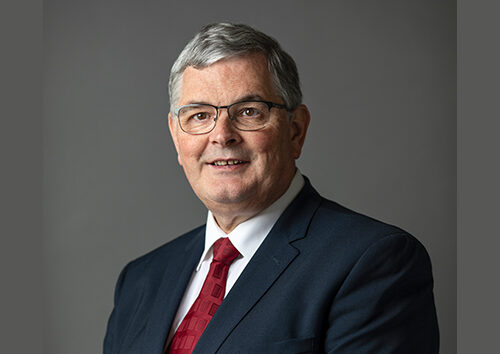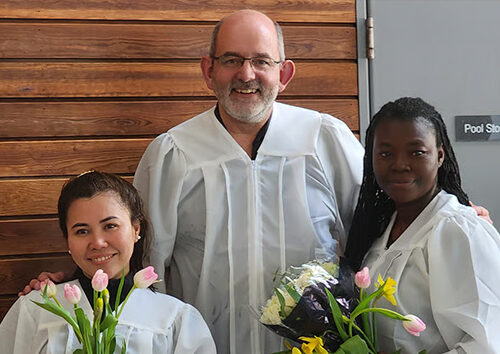31 August 2018 | Belgrade, Serbia [Sam O Davies]
If one of the aims of the European Pastors’ Council (EPC) is to inspire, then there was ample evidence from the audience that it was accomplished. Enthralled by the remarkable illumination on the well-known story of the woman caught in adultery, Gifford Rhamie (Lecturer and Director of Field Education at Newbold College of Higher Education) appealed to mind and emotion during the early morning devotional on the Thursday’s theme of “Inspire.”
![Pastor Gifford Rhamie [photo credit: Elise Tjeransen/ADAMS] EPC18 Rhamie](https://ted.adventist.org/sitenews/wp-content/uploads/2018/08/images_news-2018_EPC18-Rhamie-scaled.jpg) At the end of his 35 minute delivery, spontaneous applause from the audience came across as an affirmation of a message relevant for our congregations to REACH EUROPE, the central theme for the EPC.
At the end of his 35 minute delivery, spontaneous applause from the audience came across as an affirmation of a message relevant for our congregations to REACH EUROPE, the central theme for the EPC.
Sakari Vehkavuori, a pastor from Finland, could not help but to share with me that “Gifford was able to depict a picture of a true church that is able to welcome people.” He added, “I think this has been the biggest struggle for the church, we don’t truly know how to welcome everybody.” Sakari said, “As a church, we appear to be further away from the real world, but this message is calling us back to where the people are, where Christ was.” He also added, “so far, this is the most moving message for me at this conference, and I plan to share the link of this sermon with my church members.”
Rhamie portrayed the familiar New Testament story taken from John 8:3-11 through the eyes of a 21st century person. He used imageries such as videotaping the woman and posting it on YouTube and other social media to prove to Jesus, whom they called Rabbi, and for all to see that she was caught in the very act. She was made guilty before trial.
As this woman was brought before Jesus, he was left to be the sole judge. Standing before Jesus, she was shaking like a leaf. Referring to her agony of standing before the Rabbi Jesus and knowing that she was guilty, Rhamie said, he would rather stand before Jesus, than before his parents, or the church board and other bosses. Because in Jesus, there is compassion, there is forgiveness, there is a second chance.
Those who brought her knew that according to Moses’ law, such a crime is punishable by death. They asked Jesus, what do you say Rabbi? From here, Rhamie’s sermon took a turning to probe into the interactions, first between the accusers of the woman and Jesus and then between the woman and Jesus.
Rhamie shared three scholarly interpretations on what Jesus, wrote on the ground. First, those who suggest that Jesus was writing down their accusations and then wrote the verdict and as they read it, they drop their stones one by one. Another commentator, he said, has it that Jesus was writing down their sins which caused them to leave the scene. A third commentator has it that he was writing down the ten commandments. When they read, thou shall not steal, a few stones fell. When they read, thou shall not kill; still, a few more stones fell. When they read, thou shall not commit adultery, a whole load of stones dropped. Eventually, Jesus was left alone with the woman.
Focusing on the interaction between the woman and Jesus, Rhamie elucidated the meaning of “Go and sin no more” and asked the question, where could she go? He then expounded on what it would mean if Christ meant she should go and never sin again, which would amount to sentencing her to a life of failure. Go but don’t do it again.
The kernel of the message came alive when he explained that the power was in the “Go” which was a Rabbinic blessing. This blessing was pronounced by the Rabbi to go in peace. Go into the future of peace. The peace or shalom means that you are no longer constrained by your past. Instead, you are released into a future where you can grow with God and in harmony with your fellow human beings. A word that demands that we should go and reach out to others. Especially those who don’t look like us. This he explained is the shalom. The woman could not go back to the man who was long gone.
Rhamie asked the question, so why do we treat women the way we do? Women, out of whom all humanity has come, women who are the gentler of the sexes. When we commit a crime against women, we are normalising all other kinds of crime against women. The day we start to treat women equally, is the day we begin to treat all humanity equally.
Rhamie’s conclusion focused on the question, “Where can I go?” by reading a poem he wrote:
“If this is not a place where my tears are understood,
Then where can I go to cry?
And If this is not a place where my spirit can take on wings,
Then where can I go flying?
If this is not the place where my questions can be asked?
Then where can I go to seek?
And if this is not the place where my failure and anguished can be released unhurt,
Then where can I go to speak?
If this is not the place where my sins are forgiven,
Then where can I go to be free?
And if this is not the place where my eyes can be opened
Then where can I go to see?
And if this is not the place where they will accept me as I am,
Then where can I go to be?”
He then called his audience to action to be relevant in the 21st century, to all kinds of people. He said, as a church, we should somehow, be able to have safe spaces where they can come and find peace, shalom. We have to see the church as a place not so much for us but for others. Church, he concluded is for beggars who tell other beggars where to find bread. The church is for sinners who tell other sinners where to find a saviour.
INSPIRE TALKS
Two inspire talks focused on “How to prevent infidelity” by Pastor Gabor Mihalec (Hungarian Conference) and the second, “How to Inspire people to be Healthy” by Dr Chidi Ngwaba (South England Conference Health Ministries Director).
![Gabor Mihalec, PhD [photo credit: Tor Tjeransen/ADAMS] EPC18 Mihalec](https://ted.adventist.org/sitenews/wp-content/uploads/2018/08/images_news-2018_EPC18-Mihalec.jpg) Gabor Mihalec began his presentation by saying that there is a pattern to infidelity. Therefore it is explainable, predictable and preventable. He focussed his presentation on the latter, “How to prevent infidelity in your marriage” by sharing three steps to affair-proof marriage.
Gabor Mihalec began his presentation by saying that there is a pattern to infidelity. Therefore it is explainable, predictable and preventable. He focussed his presentation on the latter, “How to prevent infidelity in your marriage” by sharing three steps to affair-proof marriage.
The first step for each couple is to “Define their relationship.” This involves asking the questions, “Who are you to each other” and “what are you expecting from each other?”
The second step is to mark and protect the boundaries of your relationship. Here each must take the responsibility of guarding the relationship.
The third is to give the marriage 100%.
He captured the summary of his presentation under the heading of:
Loyalty Resolution: I am married, which means that I have narrowed my perceptions of intimacy to accept only the signals and responses of one person. I want to be a good spouse for that person, and that person alone. I have intentionally chosen her/him and don’t want to spend the rest of my life looking for closeness and intimacy in the company of others. I have no desire or intention to squander the gift of my sexuality on anyone else.
I will resolutely protect our relationship against all intruders, taking special care to guard its boundaries in all circumstances. I will take responsibility for my words and actions. I will avoid ambiguous language that may encourage flirtation on any kind and will make it clear to all that I love my spouse and that I am not available for a relationship with anyone else.
“How can we inspire people to be healthy?”
![Dr Chidi Ngwaba [photo credit: Tor Tjeransen/ADAMS] EPC18 Chidi](https://ted.adventist.org/sitenews/wp-content/uploads/2018/08/images_news-2018_EPC18-Chidi.jpg) Dr Chidi Ngwaba focused his presentation on being relevant by employing our health message to reach out to the community. He shared experiences of how people who would usually not attend our churches, were willing to come and participate in health programmes designed to meet their needs. One such programme is his “Health Colours.”
Dr Chidi Ngwaba focused his presentation on being relevant by employing our health message to reach out to the community. He shared experiences of how people who would usually not attend our churches, were willing to come and participate in health programmes designed to meet their needs. One such programme is his “Health Colours.”
Dr Chidi quoted the book, Ministry of Healing, by Ellen White, p143 to support the suggestion to be relevant.
“Christ’s method alone will give true success in reaching the people. The Saviour mingled with men as one who desired their good. He showed His sympathy for them, ministered to their needs, and won their confidence. Then He bade them, ‘Follow Me.’”
tedNEWS Staff: Victor Hulbert, editor; Sajitha Forde-Ralph, associate editor
119 St Peter’s Street, St Albans, Herts, AL1 3EY, England
E-mail: [email protected]
Website: www.ted.adventist.org
tedNEWS is an information bulletin issued by the communication department of the Seventh-day Adventist Church in the Trans-European Division. Readers are free to republish or share this article with appropriate credit including an active hyperlink to the original article.



